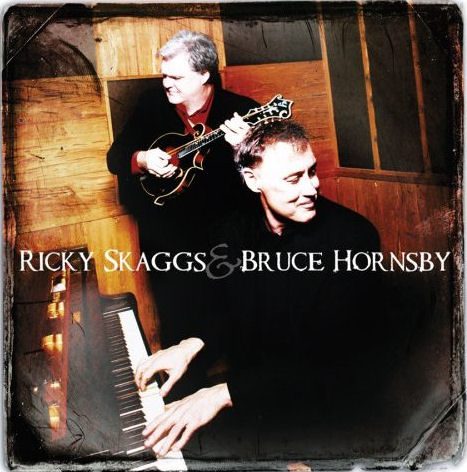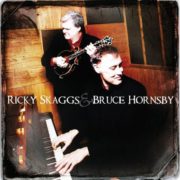RICKY SKAGGS and BRUCE HORNSBY
CHASE CLUCK OL’ HEN
in CONCERT
 As collaborations go Ricky Skaggs and Bruce Hornsby recent live album, Cluck Ol’ Hen, and tour may seem unlikely. But, hearing them the first time together is a revelation. It would be hard to imagine two more diverse popular artists coming together, and while their common roots, may not be apparent, they do run deep. Both artists scored popular success during the same era of the 1980s, a time of transition when record labels were willing to take risks on performers who did not always seem to be ready-made for commercial success.
As collaborations go Ricky Skaggs and Bruce Hornsby recent live album, Cluck Ol’ Hen, and tour may seem unlikely. But, hearing them the first time together is a revelation. It would be hard to imagine two more diverse popular artists coming together, and while their common roots, may not be apparent, they do run deep. Both artists scored popular success during the same era of the 1980s, a time of transition when record labels were willing to take risks on performers who did not always seem to be ready-made for commercial success.
I recently had the pleasure of talking with both artists inseparateinterviews. The result reveals why the two men have such a great rapport. Both are artistic seekers, never playing the same song the same way twice. They are both energetic and restless instrumentalists who journey through songs with finesse and a level of skill that can provoke a dizzying kind of pace and easy-going passion. Put them together in studio or on a stage and the result is explosive. If their backgrounds are different with Hornsby’s improvisational style reminiscent of Keith Jarrett and Ricky Skaggs’ pure, clean influence from the First University of Bill Monroe, the results of both their solo and collaborative work breath with the unadulterated energy of musical life that only comes from artists who have mastered their instruments.
Skaggs, born and raised in Kentucky, came up through the world of bluegrass, gigged with Emmylou Harris’ Hot Band and found mainstream country music success scoring eleven number one hits on the national country charts from 1981 to 1989. In 1985 he won the CMA Country Music Entertainer of the Year. His is the one and only bluegrass artist to be honored with this award. Over the years, he has received 14 Grammy awards.
As the trends of mainstream country turned more toward pop-rock sounds, Skaggs made the choice to re-focus his career on his roots. “Mr. Monroe and my dad both passed away in 1996. Country music was becoming a big circus; just a tent show. It was just not ever me. I was never tempted to be that kind of entertainer. I knew I wasn’t going to last in a situation where there was that kind of expectation.” Skaggs explained. With the passing of his mentor, Bill Monroe, Skaggs devoted more time to bluegrass and less to popular country chart success. In 2000, he founded his own record label, Skaggs Family Music and began work on a tribute to Bill Monroe,Big Mon: The Songs of Bill Monroe. He has continued to record and tour with his band, Kentucky Thunder and has become a driving force behind the current bluegrass scene.
It was in 2000, while working on Big Mon Skaggs struck up a musical connection and friendship with pianist and singer-songwriter, Bruce Hornsby. According to Skaggs, “The first time I heard him play back in the 1980s, I heard banjo rolls on the piano with his right hand. It got me to thinking of Earl Scruggs. When we got acquainted, I asked if he had been to many bluegrass festivals.” Skaggs said and laughed. “He said he had seen Leon Russell and New Grass Revival, Earl Scruggs and John Hartford in Virginia!”
When the two artists began their first album together simply titled, Ricky Skaggs and Bruce Hornsby, they were asked to take an unusual direction. Skaggs said, “Bruce just loved the old Kentucky mountain music. We had not really put anything together for that record when we met in the studio. People were asking us to come up with some kind of 1980s Firefall sound. But, I asked Bruce, ‘Ever hear of Roscoe Holcomb?’ He smacked the table and said ‘That’s what interests me. That’s what I want to do!’”
While Skaggs’ traditional bluegrass base seems far removed from the improvisational jazz-rock strains of Hornsby, he was quick to say, “I can’t say I’d ever tried to play jazz but it’s always been something I’ve enjoyed.” According to Hornsby, “Bluegrass and Jazz music have at least two common aspects. They are both very much about virtuosity on the instrument, and they both feature really fast tempos!”
Bruce Hornsby is a rare breed in popular music. He travels through genre and projects with minimal ego absorbing himself in the spirit of whoever it is he is working with. The result is inspiring and energizing for both musicians who work with him and the audiences who participate by listening. The first striking experience is whatever role Hornsby plays, there is a core to what he is doing that is distinct and creates a soundscape for whoever he plays with. “I’m always in search of the chills, in search of that feeling of being deeply moved. It’s really hard to give yourself chills, at least it is for me, but that’s my aim.” He said and then added, “Or, I’m looking for something that makes me laugh!” From the beginning Hornsby has been a true musical journeyman.
Born and raised in Virginia, Hornsby began playing professionally in his brother’s Grateful Dead tribute band in 1974. He studied music at the Berklee School of Music and graduated from the University of Miami in 1977. After making his way to Los Angeles and scoring films and television, he formed The Range in the mid-1980s. As a result he was signed to Warner Bros and scored a #1 hit song, The Way It Is. The song is unique in popular music in that it comes across as a smooth commentary that is easy to listen to, however the words point to the ongoing problem of racism in America.It is a classic of this kind of social commentary similar in impact to Billie Holiday’s recording of Strange Fruit.
Unfortunately, according to Hornsby, it remains sadly relevant today. “The Trayvon Martin tragedy certainly reminds us that we still have a ways to go as a nation in the race relations area. And anyone who is at all familiar with the great work being done daily by Morris Dees, Richard Cohen and the Southern Poverty Law Center knows that there is a large undercurrent of virulent racism that constantly festers on the fringes of our society.”
Since the late 1980s Hornsby’s improvisational skills grew as a result of playing over 100 shows with The Grateful Dead. He was a member of the band for two years. “I was always into improvisation,” He said, “in fact two of my early hit songs featured lots of soloing, a rarity on pop radio. But I had never played one song for an hour until I played with the Dead! Mostly I was influenced by them as a songwriter; I love their songs and think they are really under-appreciated as songwriters.”
The project with Ricky Skaggs has also been another growth experience for Hornsby. “We realized clearly at the Big Mon recording session that we had an easy rapport and true musical connection, and that we wanted to explore it more deeply. And it has never abated; every time we get together, we have the same feeling, both personally and musically.” He said.
As the new live album Cluck Ol’ Hen, recorded at the final performance of the 2007 tour, attests, if you go in skeptical of bringing two musical forms together, you’ll come out a believer, at least in the music made by these two artists. Skaggs told me, “Man, the live shows are going great. It’s something you really have to see to believe. There is so much going on. Hearing it is one thing, but being there something else! We don’t always do what we set out to do. Sometimes something completely different comes out. Sometimes we’ll get into something like The Beatles and James Taylor and then, out comes Django.”
Cluck Ol’ Hen and this current tour, in a relaxed and good natured way, show the best of what artistic collaboration can be. What Ricky Skaggs and Bruce Hornsby have succeeded in doing while they have made successful music together is to demonstrate how we can put aside perceived traditional differences (like purity in musical forms) and create something bright and unifying. It’s a much needed message for today’s weary world.
Terry Roland is an English teacher, freelance writer, occasional poet, songwriter and folk and country enthusiast. The music has been in his blood since being raised in Texas. He came to California where he was taught to say ‘dude’ at an early age.
RICKY SKAGGS and BRUCE HORNSBY
CHASE CLUCK OL’ HEN
in CONCERT













